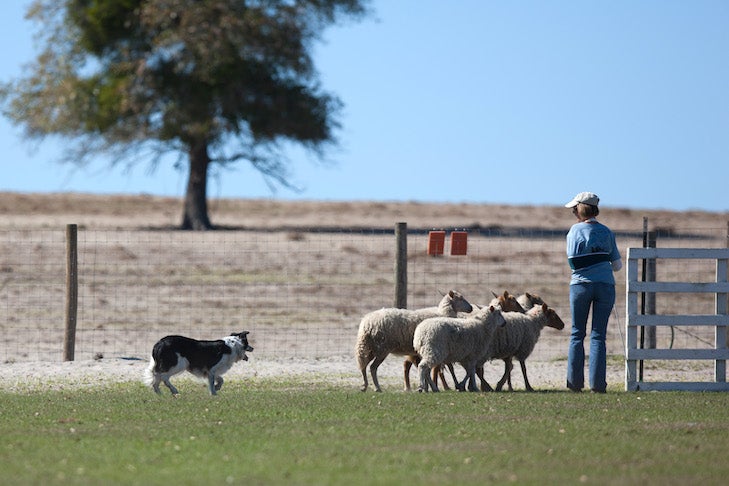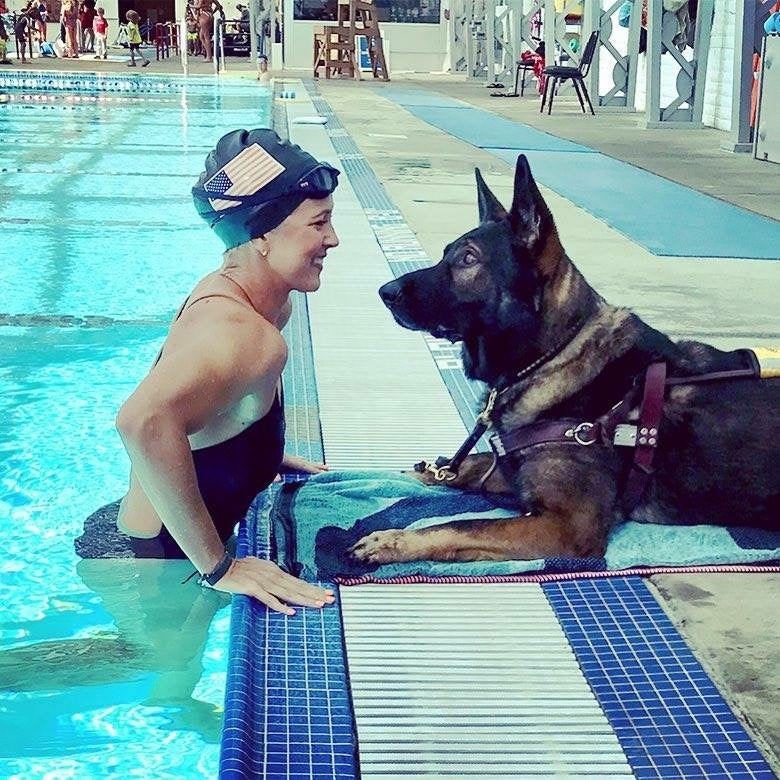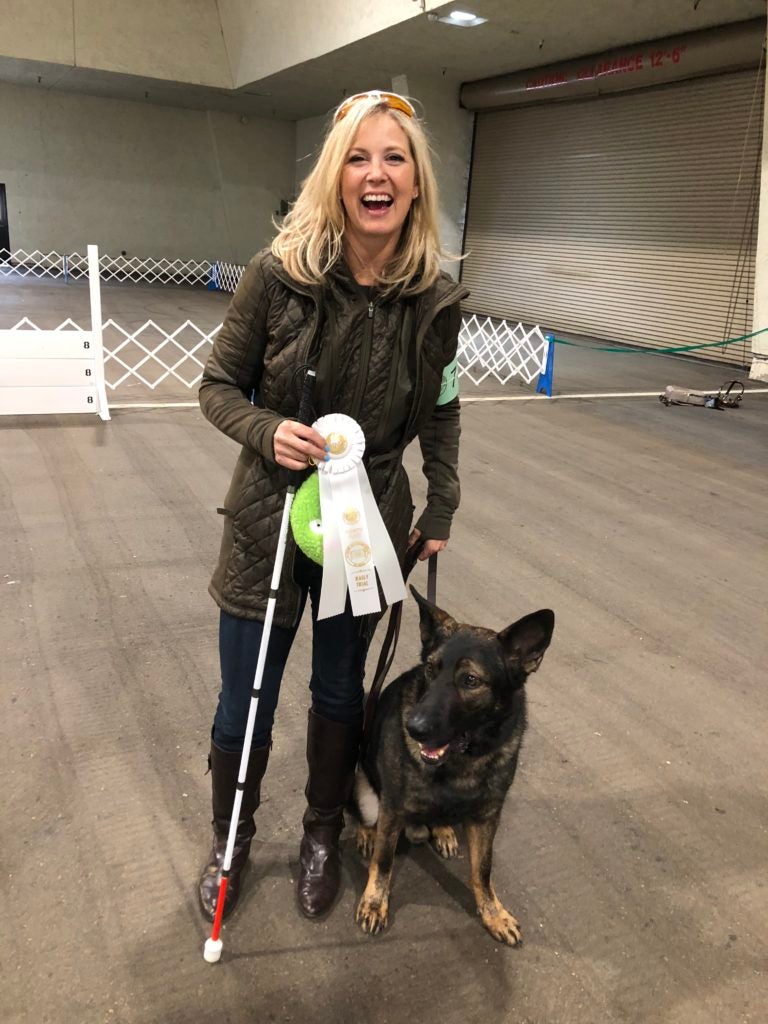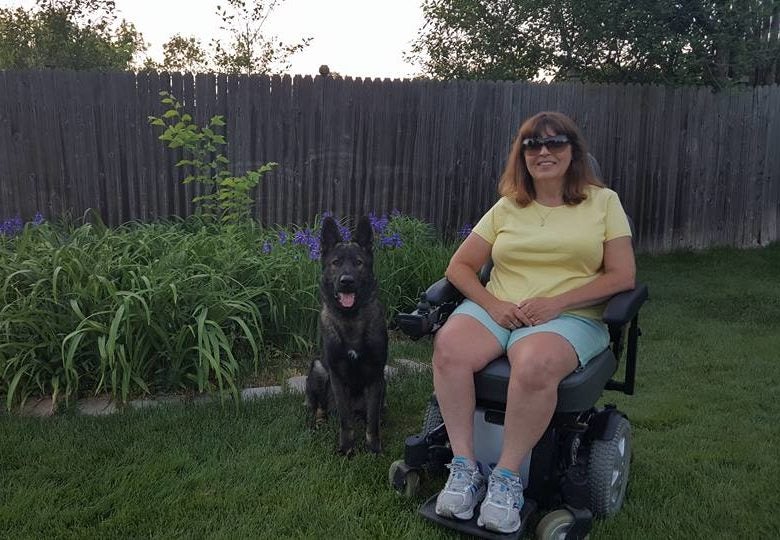
Bonding with your canine companion, meeting new people, keeping your dog physically and mentally active, and good, pure fun—just some of the reasons people participate in AKC dog sports. For people with disabilities, these benefits may seem inaccessible. AKC dog sports can be and are enjoyed by individuals with disabilities.
Today, people of varying physical ability levels around the country are participating in AKC dog sports of all kinds. AKC Judges are given guidance on how to accommodate handlers with disabilities. The specifics can be found in each dog sports Judges’ Guidelines. In some instances, there may be a need to request an accommodation not covered in the Judges’ Guidelines.
Handlers in AKC Herding, Obedience, Rally, and Scent Work
One of those people is Deb Moleski, who got her first Border Collie in 2003, after falling in love with the breed on vacations to Ireland. Within a few years, Deb was training at the Indian River Dog Training Club in Florida and entering herding trials with her beloved Tyler, now 10 years old. After Deb retired from herding following a stroke, Tyler passed the AKC Community Canine program and is now a therapy dog. He’s also in Rally training, along with Deb’s new pup, one-year-old Reba.

In AKC Rally® dogs are required to work on their handler’s left side, but Deb has limited use of her left side after having a stroke at the . Though she’s been participating in dog sports for some years now, it was only recently that she reached out to the American Kennel Club to request an accommodation to show her dogs on her right side—which was immediately granted.
Now, Deb can comfortably participate in an activity that, she says, has given her a sense of purpose, made her more patient, and improved her self-esteem—not to mention bringing her closer to her dogs. And she’s committed to making sure other people know the opportunities are out there for them, too. “I don’t want other people to think they can’t do something when they can,” she told me. “It’s right there. Happiness is within your grasp.”
Bonding With a Service Dog Through Dog Sports
Dog sports have also deepened Amy Dixon’s relationship with her dog, Woodstock. Woodstock is a six-year-old Black Sable German Shepherd, trained as a guide dog by Fidelco Guide Dog Foundation in Connecticut. Their intelligence and resilience make this particular breed a common dog of choice for police canine units and other working roles.
It was these same characteristics that made Woodstock such a great fit for Amy. Amy is a paratriathlete, ranked sixth in the world and currently training for qualifiers for the Tokyo Paralympics in 2020. It’s a job that involves a lot of travel and long stretches at the pool and the gym. But when Amy moved to Southern California a few years ago, to a home a short walk from her training facilities, Woodstock wasn’t getting the mental stimulation he was used to in their former, more urban home on the East Coast.

After a chance encounter with the owner of her local dog club, Amy enrolled Woodstock in Obedience training—and she hasn’t looked back. They completed their Beginner Novice and Novice class titles before moving on to AKC Rally and are gliding through the ranks there, too. Amy is now working with Woodstock toward becoming the first visually impaired handler to earn a Master title in AKC Rally.
“For me, the biggest challenge was not being able to see him to know if he’s in a sit, or to know if he’s standing,” said Amy, who lost 98 percent of her vision to a rare autoimmune disease. On talking to local judges, Amy and her instructor discovered that the rules allow for a guide to tell her whether her dog is sitting, and to read the signs to her that display the skills to perform throughout the rally courses at trials.
For Amy, the highlight of dog sports is “watching [Woodstock] get so excited in the ring, his enthusiasm for it. He’s super proud of himself… he’s working but he’s really having fun, he’s enthusiastic, his tongue is hanging out, he’s wagging his tail, he’s barely touching the ground because he’s so prancey… To see him light up like that,” she says, “it makes me happy.”

For anyone else interested in participating in dog sports with a disability, Amy’s advice is: “Find a really good instructor or group, like an obedience club, and surround yourself with people who are super supportive and enthusiastic. We always have cheering squads when we go to shows.”
The Social Benefits of Dog Sports
For Kelly Dixon of Tonawanda, New York, participating in Scent Work with her four-year-old German Shepherd, Atlas, has been a source of great joy. “I can’t emphasize enough how happy it makes me,” she says. Before she found dog sports, she says, “I couldn’t do a lot. But through AKC’s dog sports and accommodations they’ve made, I can go out and do things with dog people just like if I didn’t have a chair.”
Like Woodstock, Atlas is a service dog. He started out by sailing through all three levels of the Canine Good Citizen training, before progressing to Scent Work trials. When Kelly and Atlas participated in their first scent work trial recently, Kelly first reached out to the trial host and the American Kennel Club, to ensure that the facilities and restrooms for her sports were wheelchair accessible. When it transpired that the room designated for the indoor search challenge was not accessible, the club holding the trial set up a separate search area for Kelly, and later informed her that in future, they would use a different location, to allow Kelly and Atlas to search in the same area as the other teams. “I was just thrilled,” Kelly says.

“It’s exciting [for Atlas] because he’s an independent searcher and I’m just holding onto the leash,” she went on. “He’s very happy. And I think that makes his everyday life better.” And a happy dog makes for a happy owner. Kelly continued: “Being disabled, everyday life is a struggle to be successful at the ordinary things. But in dog sports I feel accomplished and successful as my dog performs the skills I trained him for.”
There are times when the AKC’s Rules, Regulations, and policies need to be modified in order for a person with a disability to compete. The AKC will make those modifications as long as doing so does not fundamentally alter the event.
How to seek accommodation for a disability in a dog-sport trial
American Kennel Club considers every application for an accommodation in dog sports on its own merits. The first step of the process is to send a request to the American Kennel Club, specifying the sport you participate in, the accommodation you need, and which rule, regulation or policy that affects. Those requests can be sent to Heather McManus in AKC’s legal department, at HRM@akc.org, or on (212) 696-8284.

